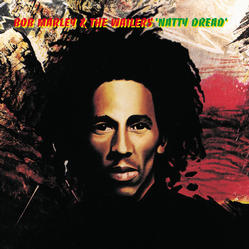
Natty Dread is the seventh album by Bob Marley and the Wailers, released in 1974. Previously Marley had recorded with Peter Tosh and Bunny Wailer as the Wailers, and this was his first record without them.

Exodus is the ninth studio album by Jamaican reggae band Bob Marley and the Wailers, first released in June 1977 through Island Records, following Rastaman Vibration (1976). The album's production has been characterized as laid-back with pulsating bass beats and an emphasis on piano, trumpet and guitar. Unlike previous albums from the band, Exodus thematically moves away from cryptic story-telling; instead it revolves around themes of change, religious politics, and sexuality. The album is split into two halves: the first half revolves around religious politics, while the second half is focused on themes of making love and keeping faith.

Catch a Fire is the fifth studio album by the reggae band The Wailers, released in April 1973. It was their first album released by Island Records. After finishing a UK tour with Johnny Nash, they had started laying down tracks for JAD Records when a disputed CBS contract with Danny Sims created tensions. The band did not have enough money to return to Jamaica, so their road manager Brent Clarke approached producer Chris Blackwell, who agreed to advance The Wailers money for an album. They instead used this money to pay their fares back home, where they completed the recordings that constitute Catch a Fire. The album has nine songs, two of which were written and composed by Peter Tosh; the remaining seven were by Bob Marley. While Bunny Wailer is not credited as a writer, the group's writing style was a collective process. For the immediate follow-up album, Burnin', also released in 1973, he contributed four songs. After Marley returned with the tapes to London, Blackwell reworked the tracks at Island Studios, with contributions by Muscle Shoals session musician Wayne Perkins, who played guitar on three overdubbed tracks. The album had a limited original release under the name The Wailers in a sleeve depicting a Zippo lighter, designed by graphic artists Rod Dyer and Bob Weiner; subsequent releases had an alternative cover designed by John Bonis, featuring an Esther Anderson portrait of Marley smoking a "spliff", and crediting the band as Bob Marley and the Wailers.

The Wang Theatre is a theatre in Boston. It originally opened in 1925 as the Metropolitan Theatre and was later renamed the Music Hall. It was designed by Clarence Blackall and is located at 252–272 Tremont Street in the Boston Theatre District. The theatre is operated as part of the Boch Center. The theatre was designated as a Boston Landmark by the Boston Landmarks Commission in 1990.
Steel Pulse are a roots reggae band from the Handsworth area of Birmingham, England. They originally formed at Handsworth Wood Boys School, and were composed of David Hinds, Basil Gabbidon, and Ronald McQueen (bass); along with Basil's brother Colin briefly on drums and Mykaell Riley. Steel Pulse were the first non-Jamaican act to win the Grammy Award for Best Reggae Album. Collectively the band has won one Grammy award with nine nominations.

Survival is the eleventh studio album by Bob Marley and the Wailers, released in 1979.
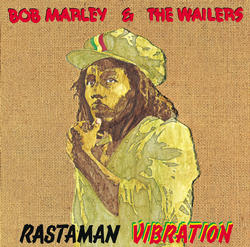
Rastaman Vibration is the eighth studio album by Jamaican reggae band Bob Marley and the Wailers, released in April 1976.

Kaya is the tenth studio album by the Jamaican band Bob Marley and the Wailers, released in 1978. The album consists of tracks recorded alongside those released on the Exodus album. It was produced by the band.

Bob Marley and the Wailers were a Jamaican ska, rocksteady and reggae band. The founding members, in 1963, were Bob Marley, Peter Tosh, and Bunny Wailer.
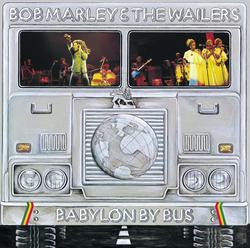
Babylon by Bus is a live album released by Bob Marley and the Wailers in 1978. The tracks on this album are considered, with two exceptions, to be from the Pavillon de Paris concerts over 3 nights, 25–27 June 1978, during the Kaya Tour, though there are discrepancies in the track listing.

Legend is a compilation album by Bob Marley and the Wailers. It was released on 7 May 1984 by Island Records. It is a greatest hits collection of singles in its original vinyl format and is the best-selling reggae album of all-time, with more than 12 million copies sold in the US, more than 3.3 million in the UK and an estimated 25 million copies sold globally. In 2003, the album was ranked number 46 in Rolling Stone magazine's list of the "500 Greatest Albums of All Time" and maintained the ranking in a 2012 revised list.
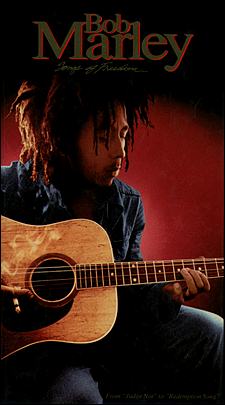
Songs of Freedom is a four-disc box set containing music by Bob Marley and the Wailers, from Marley's first song "Judge Not", recorded in 1961, to a live version of "Redemption Song", recorded in 1980 at his last concert.
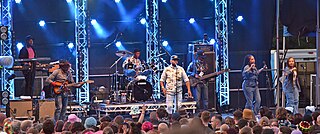
The Wailers Band is a Jamaican reggae band formed by former members of Bob Marley and the Wailers after Marley's death in 1981. It was led by bassist Aston "Familyman" Barrett until 2016, when he passed the role onto his son, Aston Barrett Jr.
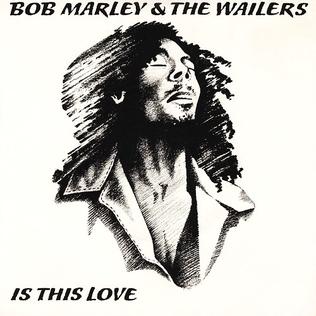
"Is This Love" is a song by Bob Marley and the Wailers, released on their 1978 album Kaya. The song became one of the best-known Marley songs and was part of the Legend compilation. It peaked at number 9 in the UK charts upon its release in 1978. A live rendition of the song can be found on the Babylon by Bus live album from Paris in 1978.

Ziggy Marley and the Melody Makers were a Jamaican-American reggae family group whose line-up consisted of the children of musicians, Bob Marley and Rita Marley, which includes lead singer Ziggy Marley with Sharon Marley, Cedella Marley, and Stephen Marley. Formed in 1979 in Brooklyn, New York, Ziggy Marley and the Melody Makers members began their musical endeavours in their pre-teens under the name the Melody Makers.
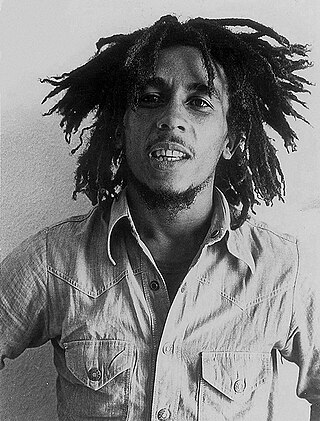
Robert Nesta Marley was a Jamaican singer, songwriter, and guitarist. Considered one of the pioneers of reggae, he fused elements of reggae, ska and rocksteady and was renowned for his distinctive vocal and songwriting style. Marley increased the visibility of Jamaican music worldwide and made him a global figure in popular culture. He became known as a Rastafarian icon, and he infused his music with a sense of spirituality. Marley is also considered a global symbol of Jamaican music and culture and identity and was controversial in his outspoken support for democratic social reforms. Marley also supported the legalisation of cannabis and advocated for Pan-Africanism.

"Waiting in Vain" is a song written by reggae musician Bob Marley and recorded by Bob Marley and the Wailers, for their 1977 album Exodus. Released as a single, it reached number 27 on the UK Singles Chart.

Donald Kinsey was an American guitarist and singer, best known as a member of the Word Sound and Power Band, the reggae backing group for Peter Tosh.

Neville O'Riley Livingston, known professionally as Bunny Wailer, was a Jamaican singer-songwriter and percussionist. He was an original member of reggae group The Wailers along with Bob Marley and Peter Tosh. A three-time Grammy Award winner, he is considered one of the longtime standard-bearers of reggae music. He was also known as Jah B, Bunny O'Riley, and Bunny Livingston.
The following outline is provided as an overview of and topical guide to Bob Marley:


















